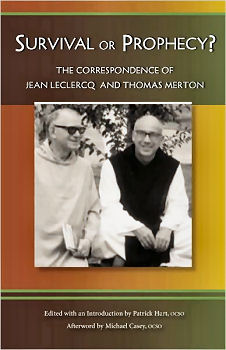
|
Posted November 12, 2009
Book: Survival or Prophecy? The Letters of Thomas Merton & Jean Leclercq Edited by Brother Patrick Hart Farrar, Straus and Giroux. New York. 2002. Pp. 196 An Excerpt from the Jacket:
Their correspondence over twenty years is a fascinating record of the common yearnings of two holy men. "What is a monk?" is the question at the center of their exchange, and in these letters they answer it with great aplomb, touching on the role of ancient texts and modern conveniences; the advantages of hermit life and community life; the fierce Catholicism of the monastic past and the new openness to the approaches of other traditions; the monastery's impulse toward survival and the monk's calling to prophecy. Full of learning, human insight, and self-deprecating wit, these letters capture the excitement of the Catholic Church in the ear of the Second Vatican Council — and the perennial appeal of the life of monastic solitude. An Excerpt from the book: Things are developing well here, however, I received permission to take some time in solitude up at the hermitage, and so far I have had six full days up there, with more to come. Not allowed to sleep there, or say Mass there, but what I have had so far is a great godsend. It has certainly settled any doubts I may have had about the need for real solitude in my own life. Though I realize that I am not the ideal of an absolute hermit, since my solitude I partly that of an intellectual and poet, still it is a very real inclination for solitude, and when I have continuous solitude for a more or less extended period, it means a great deal and is certainly the best remedy for the tensions and pressures that I generate when I am with the community. It is indeed the only really satisfactory remedy that I have been able to find. Distractions and "recreations" with visitors and active retreat work, etc. do absolutely nothing to help. Also, this little bit of solitude helps me to appreciate the real values that do exist in the common life, though they certainly mangage to get hidden when I get too much of them. I hope to take more time in retreat later in the summer or in the early fall. And perhaps get a day at a time more frequently. Table of Contents: Letter 3 |
|
